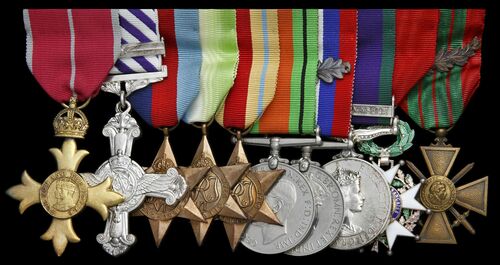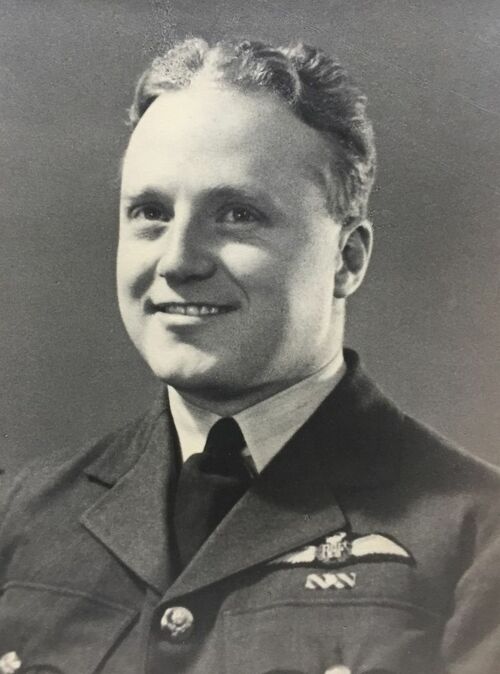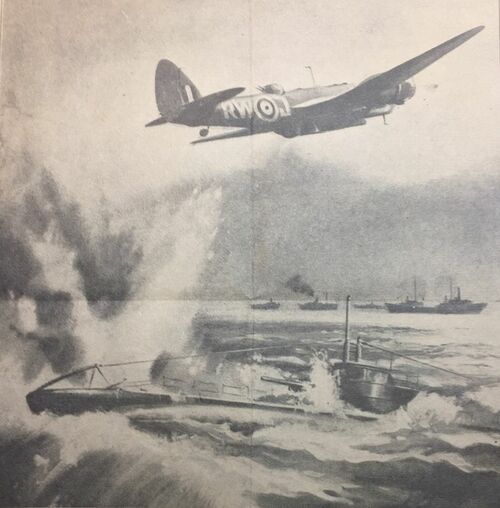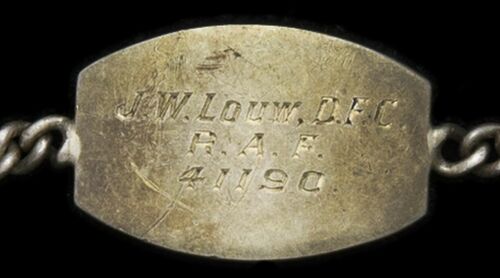Auction: 24001 - Orders, Decorations and Medals
Lot: 211
Sold by Order of a Direct Descendant
A rare Second World War Coastal Command operations 1945 O.B.E., 1941 D.F.C. and Immediate Second Award Bar group of ten awarded to Group Captain J. W. Louw, Royal Air Force, a veteran of three full Operational Tours
Close combats with Focke-Wulf Condors and a U-Boat 'kill' aside, his skills as a Pilot were much in demand in November 1942, when, at short notice, he was ordered to make a rendezvous with H.M. submarine Seraph, 20 or 30 miles south of Toulon: in dangerous sea conditions, he landed his Catalina flying boat alongside Seraph and embarked General Giraud of the Free French, just in time for him to fulfil his vital role in the North African landings
The Most Excellent Order of the British Empire (O.B.E.), Military Division, Officer's 2nd type breast Badge, silver-gilt; Distinguished Flying Cross, G.VI.R., with Second Award Bar, the reverse of the Cross and the Bar both officially dated '1941'; 1939-45 Star; Atlantic Star; Africa Star; Defence and War Medals 1939-45, with M.I.D. oak leaf; General Service 1918-62, 1 clasp, Malay Peninsula (Gp. Capt. J. W. Louw. R.A.F.); France, Republic, Legion d'Honneur, Chevalier's breast Badge, silver, silver-gilt and enamel; France, Republic, Croix de Guerre, reverse dated '1939', with Palme upon riband, mounted as worn, good very fine (10)
O.B.E. London Gazette 1 January 1945. The original Recommendation states:
'This Officer commands No. 265 Squadron and is an operational commander of outstanding ability whose powers of leadership are reflected in the efficiency and high morale of his Squadron.
He is an exceptionally experienced Pilot, having completed three Operational Tours, amounting to nearly 4,000 hours flying. He was the Pilot of the flying boat sent to pick up General Giraud at sea from a submarine in very hazardous conditions prior to the landings in North Africa. Largely as a result of this Officer's skill and initiative the operation was successful. His services have been outstanding during the last eighteen months.'
D.F.C. London Gazette 1 July 1941. The original Recommendation states:
'At Lough Erne on 21 April 1941, F/Lt. Louw was ordered to take off at 0330hrs, to search for survivors of the Empire Endurance, which had been torpedoed. The search consisted of a flight of over 500 miles from the coast, but in spite of this a lifeboat of survivors was located after a comparatively short search and its position was signalled to base. All food carried in the aircraft was dropped and was seen to be picked up by the survivors. He stayed with the lifeboat until last light, eventually alighting at Lough Erne at 0030hrs on 22 April, having flown for over 21 hours and having made a good landfall on the return journey.
On another occasion, on 6 May 1941, F/Lt. Louw was ordered to do an A/S and A/A convoy escort; on arrival at his rendezvous he found the convoy being attacked by a Focke-Wolf Condor, which he attempted to engage but which escaped by virtue of its superior performance. Over a period of 2.5hrs the enemy Pilot made two more unsuccessful attempts to approach the convoy but was driven off by F/Lt. Louw on each occasion. On the last approach, F/Lt. Louw was able to carry out a head on attack and observed bullets from his machine guns striking the enemy aircraft, which then made off and did not return. In the seventeen months he has been in this Squadron, F/Lt. Louw has flown over 900hrs on Operations and his work has been of consistently very high standard.'
The Station Commander commented:
'F/Lt. Louw is a most trustworthy Captain of aircraft who has shown outstanding zeal, patience and cheerfulness and a never failing devotion to duty.'
Bar to D.F.C. London Gazette 30 September 1941. The original Recommendation states:
'While on Convoy Escort duties on 4 September 1941, F/Lt. Louw attacked and probably destroyed a submarine. He then sighted a Focke-Wolfe Kurier and for a period of an hour and a half engaged this faster and more heavily armed aircraft at every opportunity, preventing it from bombing our shipping and eventually driving it away altogether with accurate machine gun fire.
This Officer has completed 1,300hrs Operational flying and has set a consistently high example of devotion to duty.'
French Legion d'Honneur and Croix de Guerre: decree dated 19 May 1948. It is interesting to note that these awards quite clearly stemmed from his embarking General Giraud but were not approved until well after the conclusion of hostilities. A note to the Under-Secretary of State for Air in the Air Ministry was sent from Mr Secretary Eden at the Foreign Office in June 1941, that stated:
'...a certain amount of confusion appears to exist in regard to the question of the bestowal of British war decorations upon members of the Free French forces, owing to the conflicting views which are held on the subject in different quarters. The matter is rather complicated by the fact that it is not desirable to encourage reciprocal awards to members of His Majesty's forces, for the reason that as General de Gaulle is not a Head of State it is not possible for His Majesty's Government to recognise either decorations of his own creation or his power to confer French decorations already existing, such as the Legion of Honour and the Croix de Guerre.'
James Willem Louw was born at Heidelberg in the Transvaal, South Africa on 14 June 1918 and was educated at the King Edward VII School, Johannesburg.
Granted a short service commission in the Royal Air Force in September 1938, and having been confirmed in the rank of Pilot Officer in July 1939, he was posted to Coastal Command.
Coastal Command - 'Double D.F.C.'
He subsequently commenced his first operational tour as a 2nd Pilot in London IIs of No. 240 Squadron in November 1939, but converted to Stranraers in the summer of 1940, and to Catalina IIs in March 1941; he became a 1st Pilot in December 1940.
His extended tour of duty, which lasted until October 1941, took him from Calshot to Invergordon - and elsewhere - and comprised nearly 1500 hours of operational flying and more than 130 sorties, most of them of an anti-submarine and convoy escort nature.
On 20 April 1941, Louw was ordered to search for survivors from the Empire Endurance. She had originally been launched as the Alster by Deschimag Werk Vulkan, Hamburg, Germany for the shipping company Norddeutscher Lloyd. In the years leading up to the Second World War Alster carried cargo and passengers between Germany and Australia. After the outbreak of war she was requisitioned by the Kriegsmarine for use as a supply ship.
Alster was captured off Norway on 10 April 1940 by the British destroyer Icarus. Initially serving under the original name as a repair, supply and cargo ship in Norway, she was later passed to the Ministry of War Transport and renamed Empire Endurance. She served until 20 April 1941, having left Milford Haven for Cape Town. Loaded with 90 crew and 5 passengers on board, her cargo included the Fairmile B motor launches ML-1003 and ML-1037. She was torpedoed and sunk by the German submarine U-73, Captained by Helmut Rosenbaum - himself a holder of the Knights Cross who notched up 6 'kills' for a total of 35,171 tons and three warships - south-east of the islet of Rockall in the North Atlantic, at which point Louw entered the stage. His fine work in locating the lifeboats and doing all he could to supply them ensured that H.M.C.S. Trillium fished out 20 crew and 4 passengers on 21 April and 5 crew were latterly located by Highland Brigade on 9 May.
Louw further distinguished himself in defending a convoy on 4 September 1941, engaging and probably destroying a U-boat, gallant work that was recognised by the award of an Immediate Bar to his D.F.C.
Air Chief Marshal Sir Philp Joubert, the A.O.C. Coastal Command, wrote to congratulate Louw on the award of a Bar to his D.F.C.:
'You certainly deserved it for the fine show you put up when you saved a convoy from serious damage, first by attacking and probably destroying an enemy submarine and then beating off a heavily armed hostile aircraft after a long battle.'
Further accolades - of a French variety
Louw was rested with an appointment at a Coastal Command O.T.U. from October 1941-October 1942, but he returned to an operational footing in No. 202 Squadron, a Catalina unit based in Gibraltar, in November 1942, in the acting rank of Squadron Leader.
It was in this capacity that he was called upon to conduct a top-secret mission on 7 November 1942, namely a rendezvous with H.M. Submarine Seraph to collect a special passenger: the Free French General Henri Giraud. Louw takes up the story:
'On 31 October 1942, I was ordered to collect a Catalina flying boat from Greenock in Scotland and go to Gibraltar. At the time I was undergoing a rest from operational flying. I left the United Kingdom on 5 November 1942 and arrived at Gibraltar the following morning. On arrival I was warned that I was required for a special sortie that night.
Later that day I was told by the Air Officer Commanding Gibraltar that I was required to go to a position some 20 or 30 miles south of Toulon where I would find a British submarine. On the submarine were some very important passengers. I was told to land beside the submarine and fly these passengers back to Gibraltar if possible. The Air Officer Commanding stressed the great importance of brining these passengers back and that they must be brought back safely. I pointed out that this was a difficult task, as landing and take off in the open sea was a difficult operation and would always be dangerous. However, the decision was left to me, to judge the conditions of the sea on arrival at the rendezvous.
I took off shortly after midnight on 7 November 1942 and arrived at the rendezvous at dawn. After a search of approximately 45 minutes, I located the submarine. The sea conditions were very bad and although I thought the chances of landing and taking off again were small, I decided to make the attempt. The landing was successful but the sea was so rough I thought the aircraft would break up, or be seriously damaged. The submarine came to within 30 yards, and preparations began for transferring the passengers to the aircraft.
Just before the passengers began to be transferred an aircraft arrived and circled us at about two miles distant. As we were over 700 miles from the nearest British base I realised it could not be one of ours. However, after circling us, the aircraft flew to the north, remaining unidentified.
The transferring of passengers took one hour and 25 minutes. They were brought across in small boats. It was not until the passengers had come aboard that I knew who they were. The party consisted of General Giraud, his son, two French officers, an American Colonel, and an American Naval Captain. The Naval Captain introduced me to Giraud and explained that it was the intention of the Allies to land in North Africa the following morning and that it was very important General Giraud should be there when the landings were made. The submarine would have arrived too late, necessitating the use of an aircraft. I then realised fully the importance of the mission and the necessity of getting off safely without injuring the General.
The sea was by now even rougher than when I landed. However, the take-off, though very rough, was successful, and we arrived back at Gibraltar without further incident. I regret that I cannot give any accurate positions or times as all my logs and charts were taken from us for security reasons.'
Louw - rated as an 'exceptional' pilot for most of his career - was subsequently appointed a Chevalier of the Legion 'd'Honneur and awarded the Croix de Guerre; a French decree dated 19 May 1948, refers.
In January 1943, he was posted to another Catalina unit, No. 259 Squadron, at Mombasa, East Africa, and thence, at the end of the same year, to Madagascar, as C.O. of No. 265 Squadron in the acting rank of Wing Commander. He subsequently completed a further 200 hours of operational flying in patrols over the Indian Ocean.
Tour-expired, he was awarded the O.B.E. and returned to the U.K. in early 1945, where he ended the war as Station Commander of Sullum Voe in the Shetlands.
Postscript
Post-war, Louw was advanced to Wing Commander in July 1953 and to Group Captain January 1962.
Among other postings, he held a staff appointment in Pretoria, South Africa in the 1950s and served as Head of the Far East Defence Secretariat (H.Q.F.E.) in the 1960s. His final appointment was at No. 1 (B.) Group at Bawtry, Yorkshire and he was placed on the Retired List in March 1970.
Sold with an archive of original documentation, including:
(i)
The recipient's R.A.F. Pilot's Flying Log Books (3), covering the periods July 1938 to June 1953, with pasted-in R.A.F. Air Navigator's Certificate, dated 20 October 1939; July 1953 to July 1962, and September 1962 to January 1965.
(ii)
The recipient's M.I.D. certificate, in the name of 'A./Wing Commander J. W. Louw, D.F.C., Reserve of R.A.F. Officers' and dated 8 June 1944, in its forwarding envelope.
(iii)
Official French decree nominating him for his appointment to the Legion 'd'Honnour and related Croix de Guerre award, dated 19 May 1948, together with related warrant and correspondence.
(iv)
Congratulatory letter for his second D.F.C. from the A.O.C. Coastal Command, dated 23 September 1941, together with notifying telegram message.
(v)
Commission warrants for Pilot Officer, dated 4 October 1938, and Squadron Leader, dated 26 March 1946.
(vi)
Four wartime photographs, including studio portrait, in uniform.
(vii)
A carbon copy typed account of his top-secret mission to pick-up General Giraud, with related explanatory letter, dated in March 1948.
(viii)
A signed Official Secrets Act declaration, dated at R.A.F. Bawtry in February 1970, together with two M.O.D. retirement letters, and a stamped/signed copy of his service record.
(ix)
His silver identity bracelet.
For his miniature dress Medals, please see Lot 358.
Subject to 20% VAT on Buyer’s Premium. For more information please view Terms and Conditions for Buyers.
Sold for
£5,500
Starting price
£2000











